Additive fixative - Study guides, Class notes & Summaries
Looking for the best study guides, study notes and summaries about Additive fixative? On this page you'll find 58 study documents about Additive fixative.
All 58 results
Sort by
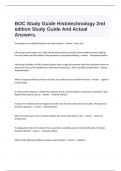
-
BOC Study Guide Histotechnology 2nd edition Study Guide And Actual Answers.
- Exam (elaborations) • 10 pages • 2024
-
Available in package deal
-
- $9.99
- + learn more
An example of an additive fixative is one that contains: - Answer picric acid Microscopic examination of an H&E stained section fixed in formalin shows marked nuclear bubbling. One most often sees this artifact if the specimen is processed following: - Answer incomplete fixation Microscopic evalution of H&E stained sections from a surgically removed small bowl specimen shows an absence of much of the epithelium in otherwise normal tissue. This most likely resulted from: - Answer d...
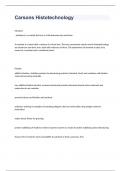
-
Carsons Histotechnology verified to pass 2023/2024 passed
- Exam (elaborations) • 111 pages • 2023
- Available in package deal
-
- $23.99
- + learn more
Carsons Mordant . substance’s or metals that act as a link between dye and tissue A mordant is a metal with a valency of at least two. The two commonest metals used in histotechnology are aluminum and ferric iron, both with valencies of three. The attachment of mordant to dyes is by means of a covalent and a coordinate bond. Fixative additive fixation- stabilizes proteins by denaturing proteins (chemical, heat) and combines with fixative molecule becoming insoluble non additive ...
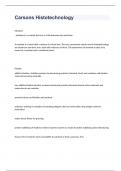
-
Carsons Histotechnology with 100% c0rrect answers 2024
- Exam (elaborations) • 111 pages • 2024
-
Available in package deal
-
- $26.49
- + learn more
Carsons Mordant . substance’s or metals that act as a link between dye and tissue A mordant is a metal with a valency of at least two. The two commonest metals used in histotechnology are aluminum and ferric iron, both with valencies of three. The attachment of mordant to dyes is by means of a covalent and a coordinate bond. Fixative additive fixation- stabilizes proteins by denaturing proteins (chemical, heat) and combines with fixative molecule becoming insoluble non additive ...
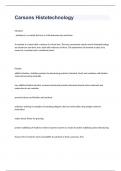
-
Carsons Histotechnology Question and answers already passed 2023/2024
- Exam (elaborations) • 111 pages • 2024
- Available in package deal
-
- $15.49
- + learn more
Carsons Histotechnology Question and answers already passed 2023/2024Mordant . substance’s or metals that act as a link between dye and tissue A mordant is a metal with a valency of at least two. The two commonest metals used in histotechnology are aluminum and ferric iron, both with valencies of three. The attachment of mordant to dyes is by means of a covalent and a coordinate bond. Fixative additive fixation- stabilizes proteins by denaturing proteins (chemical, heat) and combin...
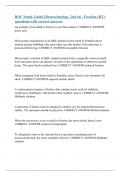
-
BOC Study Guide Histotechnology 2nd ed.- Fixation (HT) questions with correct answers
- Exam (elaborations) • 13 pages • 2023
- Available in package deal
-
- $16.49
- + learn more
An example of an additive fixative is one that contains: CORRECT ANSWER-picric acid Microscopic examination of an H&E stained section fixed in formalin shows marked nuclear bubbling. One most often sees this artifact if the specimen is processed following: CORRECT ANSWER-incomplete fixation Microscopic evalution of H&E stained sections from a surgically removed small bowl specimen shows an absence of much of the epithelium in otherwise normal tissue. This most likely resulted from: CORRECT...
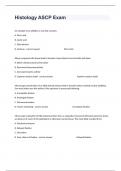
-
Histology ASCP Exam Questions With Correct Detailed Answers A+ Score.
- Exam (elaborations) • 118 pages • 2024
-
Available in package deal
-
- $18.49
- + learn more
An example of an additive is one that contains: A. Picric acid B. Acetic acid C. Ethyl alcohol D. Acetone - correct answer Picric Acid When compared with tissue fixed in formalin, tissue fixed in zinc-formalin will show: A. Better ultrastructural preservation B. Decreased immunoreactivity C. Increased enzyme activity D. Superior nuclear detail - correct answer Superior nuclear detail Micr...

-
Histotechnology - Tissue Fixation fully solved updated to pass
- Exam (elaborations) • 11 pages • 2023
- Available in package deal
-
- $17.99
- + learn more
Histotechnology - Tissue FixationAdditive fixatives Mercuric chloride Chromic acid Picric acid Formaldehyde Glutaraldehyde Osmium tetroxide Potassium dichromate Glyoxal Zinc salts Nonadditive fixatives Alcohols Acetone Acetic Acid Coagulant Fixatives Mercuric acid Chromic acid Picric acid Zinc salts Alcohols Acetone Acetic acid Noncoagulant Fixatives Formaldehyde Glutaraldehyde Osmium Tetroxide Potassium Dichromate Glyoxal Are coagulant fixatives addit...

-
BOC Study Guide Histotechnology 2nd ed.- Fixation (HT) fully solved graded A+ 2023/2024
- Exam (elaborations) • 11 pages • 2023
- Available in package deal
-
- $17.99
- + learn more
BOC Study Guide Histotechnology 2nd ed.- Fixation (HT)An example of an additive fixative is one that contains: - correct answers picric acid Microscopic examination of an H&E stained section fixed in formalin shows marked nuclear bubbling. One most often sees this artifact if the specimen is processed following: - correct answers incomplete fixation Microscopic evalution of H&E stained sections from a surgically removed small bowl specimen shows an absence of much of the epithelium in othe...
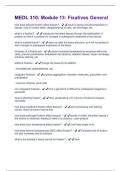
-
MEDL 310: Module 13: Fixatives General Latest Questions & Answers Verified 100% Correct
- Exam (elaborations) • 2 pages • 2024
- Available in package deal
-
- $8.39
- + learn more
how does delayed fixation affect tissues? - ️️result in drying and decomposition of tissues. loss of nuclear detail, disappearance of cells, cell shrinkage, etc. what is a fixative? - ️️substance that alters tissues through the stabilization of proteins so that it is resistant to changes in subsequent treatments of the tissues. what is a preservative? - ️️does not alter the tissue structure, so it will not protect it from changes in subsequent treatments of the tissue functions...
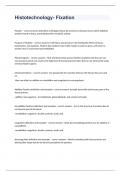
-
Histotechnology- Fixation question & answers graded A+ 2023/2024
- Exam (elaborations) • 6 pages • 2023
- Available in package deal
-
- $12.99
- + learn more
Histotechnology- FixationFixation: - correct answers Alteration of biological tissue by chemical or physical means which stabilizes proteins found in tissue, preventing further metabolic activity. Purpose of Fixation: - correct answers To kill tissue and preserve it by limiting the effects of decay, putrefaction, and autolysis. Fixation also hardens tissue which makes it easier to gross, and easier to section once it is processed and embedded. Physical Agents: - correct answers - Heat and ...

How did he do that? By selling his study resources on Stuvia. Try it yourself! Discover all about earning on Stuvia


